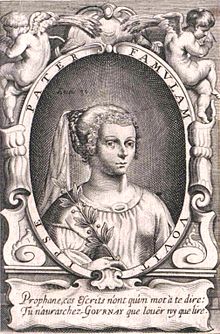Marie de Gournay
Marie Le Jars de Gournay (born October 6, 1565 in Paris ; † July 13, 1645 ibid) was a French writer , philosopher and suffragette .
Life
Marie Le Jars de Gournay was the oldest of six children in a poor family belonging to the French landed gentry. In 1568 her father bought an estate in Gournay-sur-Aronde in Picardy , the name of which she later added to her maiden name. Her parents denied her an education so that young Marie acquired her own knowledge. She secretly read books from her father's library and taught herself Latin by comparing Latin texts with the French translation. Although she was self-taught , Marie de Gournay became one of the most educated women of her time.
As a teenager she read Michel de Montaigne's Essais in 1584 . Enthusiastic about Montaigne's philosophy, she wrote to him in 1588, after which she visited Montaigne for several months. A deep friendship developed between the two. At his death in 1592 he appointed the young philosopher - whom he called his fille d'alliance ("daughter of choice") - to be the administrator of his literary estate. In 1595 she published an annotated and expanded new edition of the essays . She was also friends with Justus Lipsius and François de La Mothe le Vayer .
In 1591 Marie de Gournay moved to Paris, where she frequented the court of Henry IV and received a small pension from him. Although the beautiful woman had many admirers, she refused to marry all her life.
At an advanced age, she was often the target of ridicule in literary circles, as Tallemant des Réaux reports in the Historiette dedicated to her .
plant
Marie de Gournay translated great ancient classics such as Tacitus , Ovid , Cicero and Virgil into French. She wrote several literary and language theoretical writings, poems and a novel, Le Proumenoir de Monsieur de Montaigne .
De Gournay's main work consists of philosophical treatises on morality, theology and the situation of women. At the height of the witch burnings in Europe, she sharply and pointedly criticized the fact that women had no access to education and property: women are the sex that is denied all goods [...] in order to be the only happiness and exclusive virtue of ignorance To determine appearances of stupidity and service. She is considered the "mother of modern feminism".
Publications
- 1594: Le Proumenoir de Monsieur de Montaigne (novel)
- 1626: L'Ombre de la demoiselle de Gournay (Collected Works)
- 1634: Les advis ou les presens de la demoiselle de Gournay (Collected Works)
literature
- Mario Schiff: La Fille d'Alliance de Montaigne: Marie de Gournay. Paris 1910.
- Marjorie Henry Ilsley: A Daughter of the Renaissaince. Marie Le Jars de Gournay. Her Life and Works. The Hague 1963.
- Martine Mairal: L'Obèle. Le dernier amour de Montaigne. (2003), dt. Me, Montaigne's last love. Translated by Nathalie Mälzer-Semlinger . 2006. ISBN 3-423-24495-X .
- Brigitte Rauschenbach: The dream and its shadow. Early feminist and intellectual ally of Montaigne. Marie de Gournay and her time. Ulrike Helmer Verlag, 2000, ISBN 3-89741048-6 .
Web links
- Literature by and about Marie de Gournay in the catalog of the German National Library
- Current directory of the plants in VD 17
- John J. Conley: Marie Le Jars de Gournay (1565-1645). In: Internet Encyclopedia of Philosophy .
- on the 450th birthday of Marie de Gournay Deutschlandfunk , Oct. 6, 2015
- Ursula Beitz: About the difficulty of being able to be clever. Marie de Gournay, an intellectual in the early modern period. Neue Zürcher Zeitung , June 18, 2016
Individual evidence
- ↑ see: Sarah Bakewell: How should I live? or the life of Montaigne in one question and twenty answers. Munich 2012. p. 316.
- ↑ Essais II.17: http://artflx.uchicago.edu/cgi-bin/philologic/getobject.pl?c.0:3:16.montaigne
- ↑ see: Bakewell, p. 321.
- ↑ Beatrice Zedler: Marie Le Jars de Gournay. In: A History of Women Philosophers. Volume II. Medieval, Renaissance and Enlightenment Women Philosophers, 500-1600. Dordrecht 1989. p. 299.
| personal data | |
|---|---|
| SURNAME | Gournay, Marie de |
| ALTERNATIVE NAMES | de Gournay, Marie le Jars |
| BRIEF DESCRIPTION | French writer, philosopher and women's rights activist |
| DATE OF BIRTH | October 6, 1565 |
| PLACE OF BIRTH | Paris |
| DATE OF DEATH | July 13, 1645 |
| Place of death | Paris |
